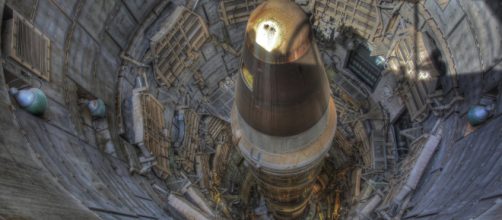Northrop Grumman, the company that won the billion-dollar contract to build the US Air Force’s next stealth bomber, is also in the race to build the USAF’s next ICBM. This week, the aerospace giant announced the Northrop Grumman’s ICBM team will develop America’s next nuclear arsenal. The new ICBM team will include some of the most experienced companies in the aerospace and defenses industries.
As mentioned earlier by Defense News, Northrop Grumman released on Monday, the official list of the companies that will join its Ground-Based Strategic Deterrent team to develop the next ICBM (intercontinental ballistic missile) for the United States Air Force.
The Ground-Based Strategic Deterrent or GBSD program is a $63 billion weapon contract that will replace the current and existing ICBM in US arsenal, the aging Minutemen III ICBM.
USAF currently maintain a deployed force of over 400 Minutemen III ICBMs throughout the vast central American plains. The service maintains this massive nuclear arsenal through a series of life-extension upgrades. The tenure of the USAF’s Minutemen III ICBM has already been extended beyond its initial 10-years service life extension. The missiles are now facing retirement by the end of the next decade, according to US Air Force.
The Boeing-Northrop issue
The Air Force’s GBSD program has been expected to be a fierce two-horse race between two defense contractors, Boeing, and Northrop Grumman.
However, in July, Boeing dropped out from the ICBM race after some argument with Northrop Grumman. Boeing gave an explanation about their recent withdrawal from the ICBM race. The company said that most of the conditions made are simply too favorable to Northrop Grumman. The company claimed that Northrop Grumman’s dominance of the solid rocket motors market would give the company an overwhelming pricing advantage in the ICBM competition, a battle that Boeing thinks it can’t win. Northrop recently acquired Orbital ATK (now called as the Northrop Grumman Innovation Systems), one of only two US-based companies that makes the large solid rocket motors used to propel the intercontinental ballistic missile (ICBM).
Aerojet Rocketdyne and Orbital ATK are the only companies that develop solid rocket motors.
Boeing’s recent withdrawal from the billion-dollar GBSD program sparked a debate about the future of the Air Force’s ICBMs. The Air Force warned that any further delays could result in the loss of an effective nuclear deterrent. But last week another twist came. Boeing has returned and told Northrop Grumman about its plans to join the ICBM team. Unfortunately, Northrop has rejected Boeing’s offer to jointly build America’s next nuclear arsenal.
In a recently released statement, Northrop Grumman said that they are no longer interested in Boeing’s partnership, and added that the company is increasingly concerned about the USAF’s deterrence mission and the country’s security.
USAF declined to comment about the Boeing-Northrop potential partnership and arguments between the two companies. The service has not provided any comment to preserve the integrity of the competitive process, according to Space News.
Northrop Grumman reveals its ICBM team
The Falls Church, Virginia-based company, has finally unveiled to the public the list of subcontractors that will join the Northrop Grumman’s ICBM team. Joining Northrop in the bid to build America’s next ICBM will be the aerospace giant Lockheed Martin and the leading rocket manufacturer Aerojet Rocketdyne. Other members of the company’s ICBM team include General Dynamics (command and control), Honeywell (guidance and missile electronics), Collins Aerospace (command and control), Clark Construction (construction integration), L3 Harris (training system), BRPH (architectural and engineering works), Parsons (engineering and construction), and Textron Systems (missile payload integration).
According to Defense News, the addition of Lockheed Martin, which is currently the world’s largest defense firm, on Northrop Grumman’s ICBM team could provide the Virginia-based company a strong cover against any accusations made by Boeing and its allies that Northrop is not playing fair and harming the ICBM competition by not including another major contractor in its ICBM team. Northrop is also adding the California-based Aerojet Rocketdyne to guarantee that America’s only two manufacturers (the other rocket manufacturer is now owned by Northrop) of large solid rocket motors will be part of the US Air Force’s GBSD program.
According to Northrop Grumman, the GBSD program will employ over 10,000 people across the continental United States.
The GBSD main headquarters will be located in a new facility near Hill Air Force base in Utah, while the Aerojet Rocketdyne’s rocket works will be spread across three facilities. The manufacturing facility will be located in Huntsville, Alabama, while the facility for the precision post-boost propulsion technology will be located n Canoga Park in California. The third one will be a newly-built facility in Camden, Arkansas.
The Maryland-based Lockheed Martin will work on the command and control system as well as the missile payload integration, while Aerojet Rocketdyne will provide the post-boost propulsion system and the large solid rocket motors. The Northrop Grumman ICBM team is expected to submit their final proposal later this year.


